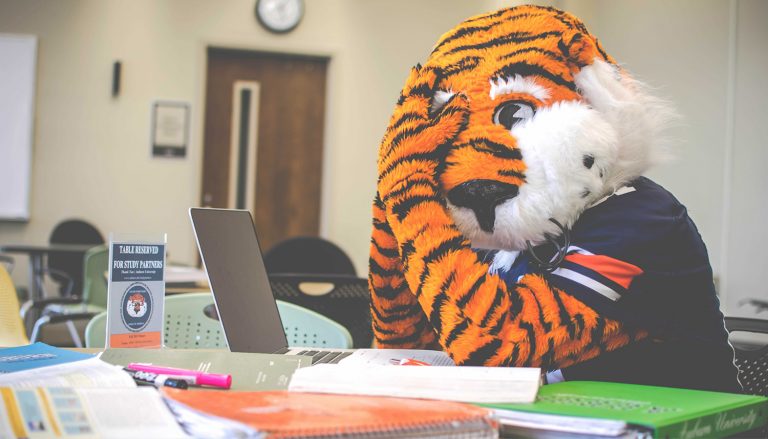Choosing a major can be a little bit overwhelming. You may find yourself thinking, where do I start? How do I know this is right for me? Why are there so. many. options???

If the idea of choosing a major is making you feel like Aubie- we’re here to help! At Auburn, we have 150+ majors housed in our 12 colleges and schools. So how do you decide what’s right for you? I’m sharing a few tips that I think will help guide you in your path to choosing a major.
- Find your passions- “If you love what you do, you’ll never work a day in your life”. When choosing a major or a future career, think about where your passions lie. You will enjoy your studies and your day-to-day work life if you’re doing something you’re passionate about. Using your passions and strengths to your advantage is a great start to choosing a major.
- Do your research- Take a look at all the majors a college has to offer. Speak to the colleges and majors you are most interested in. Try to visit the facilities, speak to faculty or staff, maybe even reach out to students in that area to see if it’s something they love. You can also consider job-shadowing or taking career advice from professionals in the field. Learning all you can about a major will help in your decision.
- Don’t judge a book by its cover- … or a college by its title? Sometimes college names can be a little deceiving. Some colleges and majors are self-explanatory, like College of Sciences and Mathematics or College of Engineering. But some colleges, like the College of Human Sciences or the College of Forestry and Wildlife Sciences have more to them than what meets the eye. Make sure you are looking into all of your options instead of just the majors you’ve heard of a thousand times. You might find a hidden gem that meets all of your passions and expectations.
- Career first- major second- How many times have you been asked “what do you want to be when you grow up?” You can take that same approach when choosing a major. If you know what job or career interests you most, you can use that to find a major.
- Narrow it down- Consider making a short list of your top 5 possibilities. See what similarities and differences they have. Having a shorter list after your initial search into all of the majors can help you further research what each program has to offer.
- Use your resources- College campuses have a number of resources available to help you succeed. The Career Center is a great tool to have. They offer career counseling, workshops, personality and career assessments and more! As you work through your first couple of years in college, visit the career center often and take advantage of what they have to offer. They are sure to help guide you towards the perfect major.
- Take Your Time- most major-level courses won’t begin until the majority of core and pre-requisite courses have been completed. This means you have, on average, two years before you have to declare a major. Don’t rush into choosing a major before you’re ready, or before you have to. Enjoy all of your core classes and see if any of those spark inspiration.
- Know what education is required- will you need to attend graduate or professional school to achieve your goals? Will adding a minor better support your career? Make sure you look at what level of education is required for your career of choice. This will let you know what major to choose, what pre-requisites you will need to take, and how many years you may be in school.
- Explore your options- Here at Auburn University we have the perfect place for that. Instead of choosing “undeclared” on your admissions application, you can choose to join our Exploratory Program. This “major” is a great resource for students to learn all about the majors Auburn has to offer. Career assessments, personality tests, class-shadowing, you name it. Exploratory has the tools to help you find your perfect fit. You will complete this program by the end of your freshman year and then can transfer seamlessly into your major of choice.
- It’s okay to change your mind- As you grow as a person and learn more about Auburn, you may strike up new passions and interests. You will be exposed to new people and experiences when you begin your college years. If you find something that suits you better, Auburn will support you in making that change. You can work with our campus resources, the career center, and your academic advisors to make the change that will be best for you!
No matter what you decide, your path is out there. You may just have to dig a little to find it. And don’t be afraid to ask for help! Here at Auburn University, we want to make sure you are not only leaving with a great education but that you are prepared for life. We are here to inspire, innovate, and transform you so that you can do the same for others.
Be sure to check out a full list of our majors to see what opportunities Auburn University can offer you!



